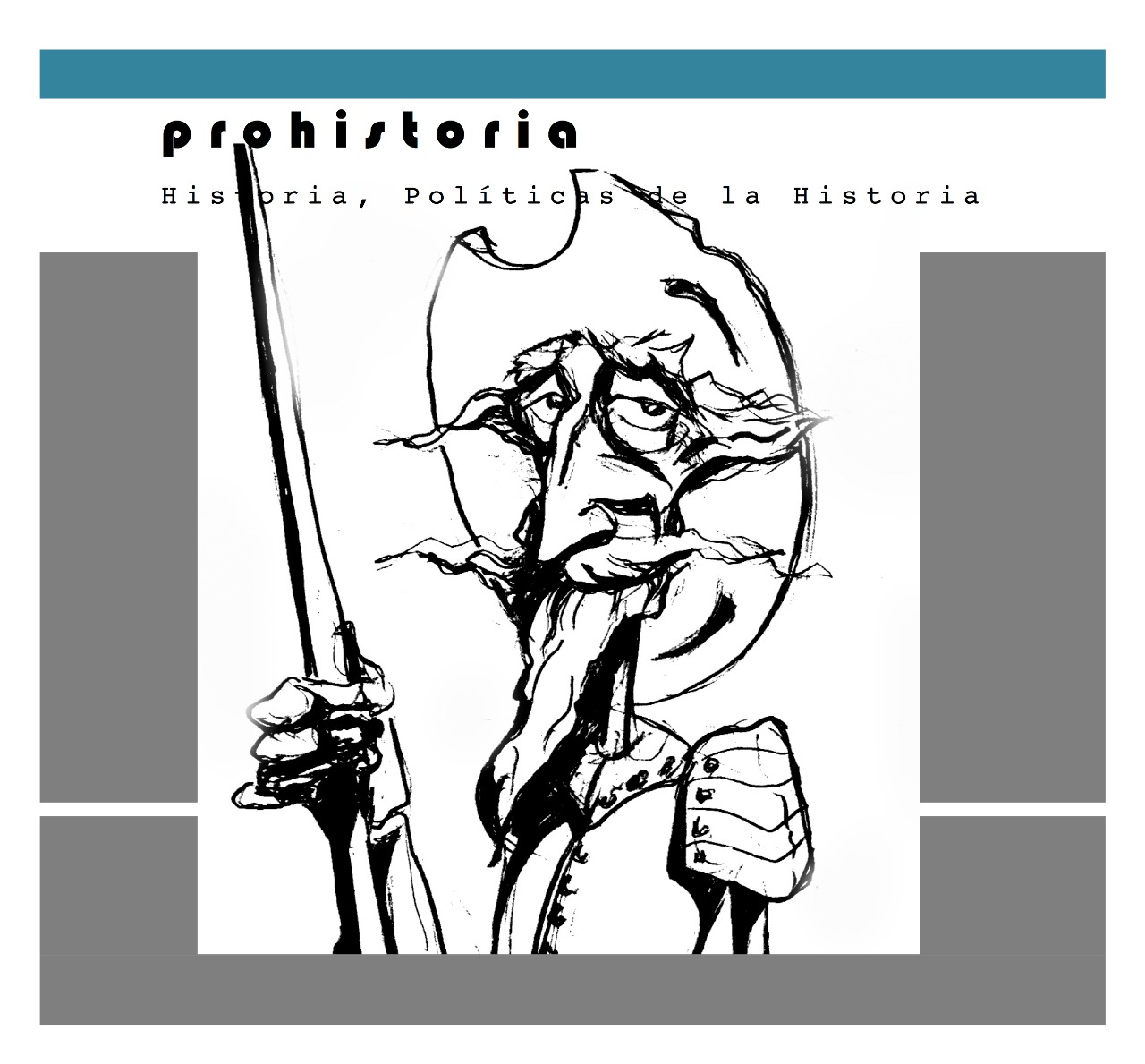"Estado de Derecho" in Argentina
Towards a conceptual History of Juridical Imagineries
DOI:
https://doi.org/10.35305/prohistoria.vi40.1791Keywords:
Estado de derecho, Constitutionalism, Conceptual History, Legal Historiography, FantasmeAbstract
This article traces the conceptual history of the rule of law in Argentine constitutionalism. It has an onomasiological section that makes explicit the traditional constitutional topic on which the concept would be assembled (1860-1930) and a semasiological study that observes the introduction and consolidation of the signifier. This last perspective defines three periods: 1) the introduction of the term in the constitutional debate of 1930-1955, 2) its dogmatisation and elevation to a principle in the light of legal positivism (1955-1983), and 3) the semantic reformulation incorporating an ethical aspect since the return of democracy (1983-2015). Each moment defines particular historical counter-concepts and imaginaries.
Downloads
References
Altamirano, C. (1985). Sobre el juicio a las juntas militares. Punto de Vista, (24), 1-2.
Böckenförde, E.W. (1991). Entstehung und Wandel des Rechtsstaatsbegriffs. Recht, Staat, Freiheit. Suhrkamp.
Botana, N. (2013). La tradición republicana: Alberdi, Sarmiento y las ideas políticas de su tiempo. Edhasa.
Casagrande, A. (2022). Populismo y Constitucionalismo en la Argentina. aproximaciones desde la Historia Conceptual del Derecho. Seqüência, (43), 1-48.
Clavero, B. (1997). Happy Constitution. Cultura y lengua constitucionales. Trotta.
Diario de Sesiones de la Convención Nacional Constituyente (1949). Tomo I: Debates y Sanción. Imprenta del Congreso de la Nación.
Donnelly, T. (2009). Popular Constitutionalism, Civic Education and the Stories We Tell Our Children. The Yale Law Journal 118, 5, 948-1001.
Dotti, J. (2000). Carl Schmitt en Argentina. Homo Sapiens.
Duso, G. (2022). Reinventare la democracia. Dal popolo sovrano all´agire político dei cittadini. Franco Angeli.
Estrada, J.M (1927). Curso de derecho constitucional, Obras Completas de José Manuel Estrada. ed. Científica y Literaria Argentina. T. VI.
Fioravanti, M. Los derechos fundamentales. Trotta.
González, F. (1909 [1866]). Lecciones de derecho constitucional. Librería de la Vda. De Ch. Bouret.
Gordillo, A. (1960). Estructuración dogmática del Estado de Derecho. Lecciones y Ensayos, (17).
Lastra, A. (1980). Conferencia del Doctor Alejandro Lastra. Revista del colegio de Abogados de Buenos Aires, (1), XL, 17-40.
Linares Quintana, S. (1970). Derecho constitucional e instituciones políticas. Teoría empírica de las instituciones políticas. Plus Ultra.
Mohnhaupt, H. (1994). Zur Geschichte des Rechtsstaats in Deutschland. Begriff und Funktion eines schwierigen Verfassungsprinzips, Acta Facultatis Politico-iuridicae Universitatis Scientiarum Budapestinensis de Rolando Eötvös Nominatae, XXXIV, 39-60.
Myers, J. (2011). Orden y Virtud. El discurso republicano en el régimen rosista. Universidad Nacional de Quilmes.
Nino, C. (2006). Juicio al mal absoluto. 2006.
Oyanarte, J. (1980). Conferencia Pronunciada por el Doctor Julio Oyanarte. Revista del colegio de Abogados de Buenos Aires, (1), XL, 60-77.
Palti, E. (2007). El tiempo de la política. El siglo XIX reconsiderado. Siglo XXI.
Palti, E. (2009). El momento romántico. Nación, historia y lenguajes políticos en la Argentina del siglo XIX. Eudeba.
Palti, E. (2014). The Theoretical Revolution in intellectual history: From the history of political ideas to the history of political languages. History and Theory, (53), 287-405.
Sampay, A. (1939). Noción de Estado de Derecho. La Ley, (14), 64-69.
Sampay, A. (1942). La crisis del Estado de Derecho Liberal-burgués. Losada.
Sarlo, B. (1987). No retroceder. Punto de Vista, (30), 4.
Segovia, J-F. (2004). Peronismo, Estado y reforma constitucional: Ernesto Palacio, Pablo Ramella y Arturo Sampay. Revista de Historia del Derecho, (32), 407-417
Sánchez Sañudo, C. (1980). Conferencia del Contraalmirante Carlos Sánchez Sañudo. Revista del colegio de Abogados de Buenos Aires, (1), XL, 41-59.
Segovia, J.F. (2019). La Constitución de Perón de 1949. El reformismo entre la legalidad constitucional y la legitimidad política. Facultad de Filosofía y Letras de la Universidad Nacional de Cuyo; Instituto de Historia Americana y Argentina.
Skinner, Q. (2007). Lenguaje, política e historia. Universidad Nacional de Quilmes,
Smith, R. (1942). La crisis del Estado de Derecho Liberal-burgués, por Arturo Sampay, La Ley, (28), 1139-1148.
Tau Anzoátegui, V. (2008) (coord.). Antología del pensamiento jurídico argentino (1901-1945). INHIDE. T. I y T. II.
Treves, R (1939). El Estado de Derecho y las nuevas organizaciones estaduales. Sustancia. Revista de Cultura Superior, (2), 161-171.
Vezzetti, H. (1985). El juicio: un ritual de la memoria colectiva. Punto de Vista, (24), 3-4.
Vezzetti, H. (2002). Pasado y presente. Guerra, dictadura y sociedad en la Argentina. Siglo XXI.
White, H. (2017). El pasado práctico. Prometeo Libros.
Wajcman, G. (2001). El objeto del siglo. Amorrortu.
Published
How to Cite
Issue
Section
License
Copyright (c) 2023 Agustín Casagrande

This work is licensed under a Creative Commons Attribution-NonCommercial-ShareAlike 4.0 International License.
- Authors retain copyright and grant the journal right of first publication with the work simultaneously licensed under Creative Commons Attribution 4.0 International License.
- Authors are able to enter into separate, additional contractual arrangements for the non-exclusive distribution of the journal's published version of the work (e.g., post it to an institutional repository or publish it in a book), with an acknowledgement of its initial publication in this journal.
Copyright of this issue © Prohistoria. Historia, políticas de la historia



















